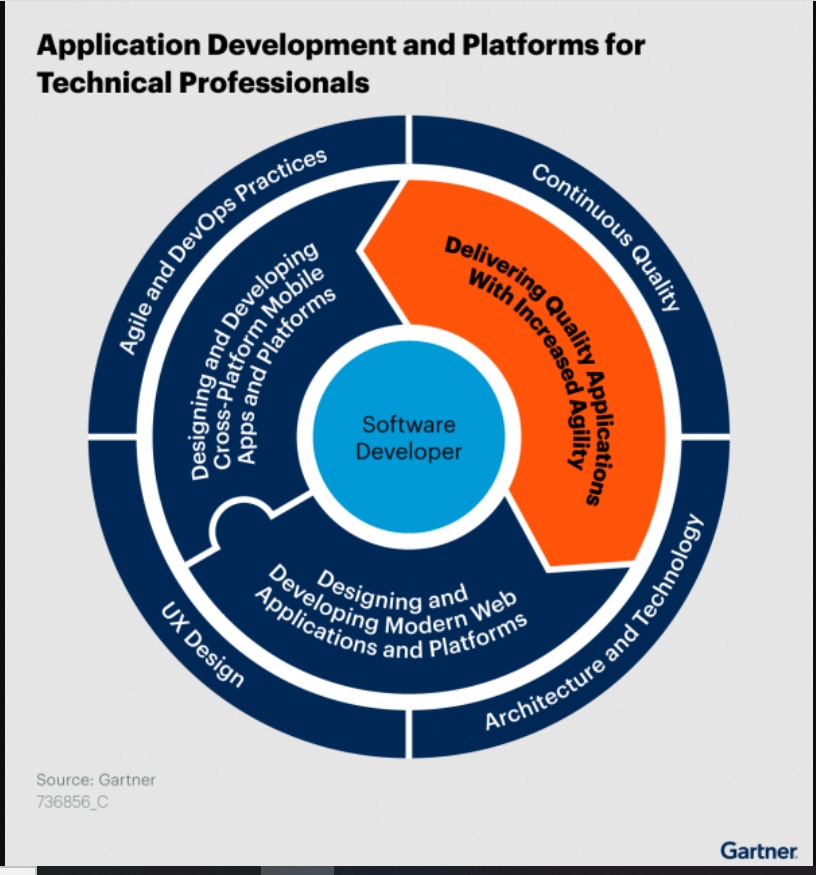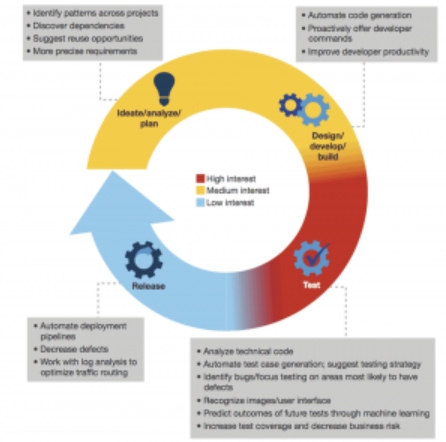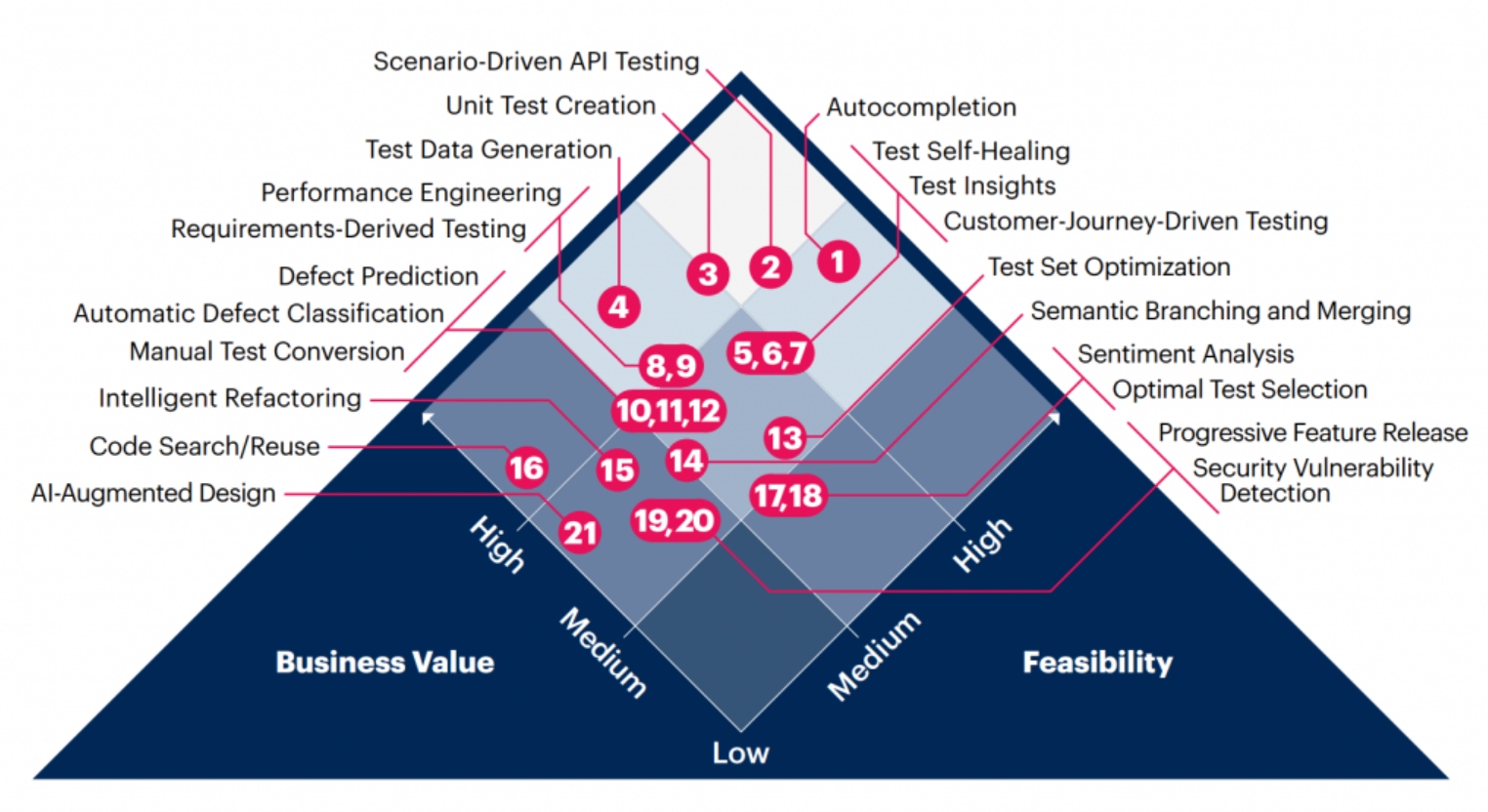Impact of AI on Software Development and Testing: Ethical and Productivity Implications of Intelligent Code Creation (ICC)
Learn how Intelligent Code Creation (ICC) leverages embedded intelligence models to offer developer assistance for writing secure and best code in the class.
Join the DZone community and get the full member experience.
Join For FreeAI technology is changing the working process of software engineers and test engineers. It is promoting productivity, quality, and speed. Businesses use AI algorithms to improve everything from project planning and estimation to quality testing and the user experience. Application development continues to evolve in its sophistication, while the business increasingly expects solutions to be delivered faster than ever.
Most of the time, organizations have to deal with challenging problems like errors, defects, and other complexities while developing complex software. Development and Testing teams no longer have the luxury of time when monthly product launches were the gold standard. Instead, today’s enterprises demand weekly releases and updates that trickle in even more frequently.
This is where self-coded applications come into play. Applications that generate the code themselves help the programmers accomplish a task in less time and increase their programming ability.
Artificial intelligence is the result of coding, but now coding is the result of Artificial intelligence. It is now helping almost every sector of the business and coders to enhance the software development process. Developers are now using AI to write codes, identify bugs, test and improve development projects.
What Is Intelligent Code Creation (ICC): AI-Assisted Code Development?
How does Intelligent Code Creation (ICC) leverage embedded intelligence and Machine Learning (ML) models to offer developer assistance for writing secure and best code in the class?
ICC aims to provide alternative methods to solve a problem and offer additional assistance for existing developers by providing them much-required help writing complicated algorithms.
It allows the developers to become productive on domain-specific code or closed enterprise-owned databases. In short, it is not an update for automatic code generation. However, it can offer assistance and guidance in developing and developing in the future.
Accenture stated in one report that 84% of Business executives believe that they need to use AI to boost their speed achieving growth objectives. As a result, artificial intelligence has become your helper instead of a threat to the human workspace.
Prospects of ICC
A recent report from IDC forecasts that the Global Market for custom application development services will grow from $47 billion in 2018 to over $61 billion in 2023. This growth will be driven and facilitated by a parallel increase in AI-powered software development. But such action doesn’t only benefit automatic code writing and bug detection since it can also automatically organize and schedule software development projects.

ICC’s ethical and productivity implications can include "AI pair programming" and developer co-pilot and AI-assisted Automated Testing practices.
There are a plethora of machine learning models like GPT-3 that are constantly developing. Furthermore, the imperative creation of newer models also touches the sky, so we can easily interpret that we will see much automated code generation and refactoring to enhance over time become a standard tool for existing and naive developers.
There is no lack of examples as we can already observe such technology in Microsoft’s embedding of AI into developed auto-suggest tools such as IntelliSense and IntelliCode. It would not be wrong to forecast that in the future, developers can focus on other skills such as core business problem-solving and solution design instead of the only implementation of writing code. You can upload your codebase to create patterns to assist with custom application development.
Benefits of ICC and AI-Assisted Automated Testing
1. Speed and Productivity
Artificial intelligence is making the process of designing, developing, and deploying software faster, better, and cheaper. AI-powered tools are helping project managers, testers, and coders become more productive. As a result, they are now efficiently producing low-cost and higher-quality software.
2. Intelligent Assistants
Intelligent programming assistants provide developers time by helping them provide in-time support, nest practices, code examples, etc.
3. Accurate Estimates
AI helps train the data from past projects, be it user stories, feature definitions, and estimates for predicting the effort and budget.
4. Strategic Decision-Making
The significant amount of time spent on variant products and features helps developers make strategic decisions about which product should be prioritized or which feature will prove more beneficial.
5. Inclusive Software Delivery Process
If the person has less experience in coding, then the ethical application of ICC will help them make the software’s delivery process more inclusive. Also, it will be more accessible for people who have certain sorts of disabilities or neurodiversity.
ICC processes reduce the time to write mundane code, but they can help developers be more creative and control their work/life balance. The primary application of Intelligent code creation is to gain efficiency. However, it is also worth considering introducing ethical issues into your software development lifecycle.
Ethical Concerns for Implementation of ICC
It is also essential to understand that ethical concerns need to be addressed for any implementation of ICC. For example, suppose we see only positive impacts of ICC on individuals. In that case, it is expected that a question will arise whether ICC will provide a select group of already "developed developers" more power. The other question that would arise is whether the expectations of higher efficiency end up stealing away the space of users for balance and creativity. Finally, it is also vital to consider the scale of implementation whether there is an outsized environmental impact, as the energy model of these models can be substantial.
Use ICC To Mitigate Ethical Risks
It is equally important for you to leverage ICC to align with organizational values to mitigate ethical risks. These organizations’ values may include environmental responsibility, inclusivity, and employee well-being. Also, make sure that you are constantly reviewing your compensation model to avoid penalizing developers who use ICC. Securities and risk reviews are still a crucial part of a security perspective. ICC can minimize human errors. However, ICC can also generate fewer common errors or unknown vulnerabilities on a systemic scale.
One of the significant factors is Transparency. It is essential because developers and managers know when ICC is in use. Also, they can monitor the long-term as well as short-term impacts of ICC on the SLDC. Last but not least, the documentation process for ICC should be as stringent as for manual code. Also, the organization’s development team should still be responsible for the quality, compliance, and security of the code they provide.
Careful Considerations and Treatments
As technology is continually evolving, there’ll be a dependency of ethical applications on use cases and implementations. However, to reduce potential damage and assure positive results, careful consideration and treatment are a must.
- This will improve the productivity of developers and novices and increase the speed and quality of application builds.
- Tech leaders must provide AI-enabled tools to their developers so they can save more time. This can speed up the development process and allow developers to focus more on creativity.
1. GPT-3
There are wide applications under the GPT-3 umbrella. For example, it’s part of the Natural Language Processing field in AI, which uses language prediction models. GPT-3 is a third-generation language prediction model that uses 175 billion parameters derived from machine learning models.
GPT-3 assists users in building their applications quickly by describing everything in text.
The system produces the code based on the user input. This also helps assist programmers in the rapid prototyping of an application. Additionally, it accelerates the development of an application.
2. AI-Assisted Software Development
Custom software development services is a $70 billion market growing at 5% per year.
AI is creating new opportunities for developers. AI opens more doors for developers than it closes. As a result, the capabilities of AI-supported applications/software will increase extensively.
It gathers relevant features and patterns without a human explicitly encoding this knowledge. As a result, AI applied to computer programming is changing how humans identify, define and implement software development.
3. AI-Powered DevSecOps
AI is redefining every phase of creating, editing, testing, and managing requirements documents. As a result, AI-based requirements management platforms are helping DevOps teams to save a considerable amount of time. In addition, DevSecOps teams are using AI to analyze the reasons behind good and bad coding.
4. AI-Powered App Security
AI and ML are used today for:
a. Static Application Security Testing (SAST): A “white box” security testing that will help to examine the product source code, byte code, or application binaries for conditions indicative of a security vulnerability
b. Dynamic Application Security Testing (DAST): “Black box” security testing that will help to examine the application in its running state and will try to poke it and prod it in unexpected ways to discover potential security vulnerabilities
c. Operate SecOPS: A robust production security testing program would consist of monitoring and dynamically filtering security events, automated vulnerability scanning, and configuration enforcement
d. Penetration Testing: Simulate a multitude of real-world attacks
e. Software Composition Analysis (SCA): Verification of the third-party libraries, frameworks, and components used within the application (all of the code that you and your team did not write is considered by SCA tools)
5. AI-Assisted Testing
a. Poor software quality cost US organizations an estimated $319B in 2019, according to the Consortium for IT Software Quality’s report on the cost of poor quality software in the US.
b. 40% of DevOps teams will be using application and infrastructure monitoring apps that have integrated artificial intelligence for IT operations (AIOps) platforms by 2023, according to Gartner.
c. Start-ups offering AI-powered software development tools raised $704M over 12 months ending September 2019, according to a Deloitte report published earlier this year.
AI-Enabled Testing Is the Natural Step After Automation
Research by Forrester argues that testing is currently the “most popular phase of the software delivery life cycle in which to apply AI.” According to a Forrester Research report on AI’s impact on software development, the bulk of the interest in applying AI to software development lies in automated testing and bug detection tools.

Agile and DevOps teams still suffer from “tunnel vision” when finalizing what quantity of testing is enough. To boost quality and optimize cost, application leaders should motivate their teams to adopt upstream thinking, focus on them, and right-size team structure and technology. In addition, application leaders need to develop their teams’ competency in autonomous testing to remove the testing blockage and enhance release cadence.
Various ICC Tools in the Market
A 2018 Forrester study found that 37% of companies involved in software development were using AI-powered coding. Now, with companies such as Tara, DeepCode, Kite, Functionalize, and Deep TabNine, and many others providing automated coding services, it’s likely that this percentage is higher and growing higher still. Here are the various ICC tools in the Market:
1. Microsoft Sketch2Code
Microsoft Sketch2Code is trained to perform object recognition against HTML hand-drawn patterns to detect significant design elements in an image.
2. Kite
Kite offers AI-powered code completions in various languages. It allows developers to efficiently complete words, paragraphs, or even many code pages in a single critical shot.
3. Visual Studio IntelliCode
IntelliCode aims to offer semantic and context-aware line completions. Also, it suggests developers use the Best APIs instead of using listing all the APIs available.
4. Codota/Tabnine
Codota/Tabinine suggests smart snippets based on your codebase. Apart from that, it provides training on the best of the class codes to offer.
What to Expect in the Future
Will we see the transition to, in the words of Google CEO Sundar Pichai, Software becoming a system that “automatically writes itself”? Maybe in the future, computers will write their own programs and use machine learning for self-learning and adaptation.
Technology leaders should now provide AI-enabled tools to their developers to save more time and labor. This will speed up the development process and allow developers to focus more on creativity and innovation.

a. AIOps platforms improve decision-making across I&O personas by examining a large amount of operational data. I&O leaders must use AIOps platforms to boost analysis and insights across the application and augment IT service management and automation.
b. Demand for assisted service remains high as investments in self-service fail to fulfill customer expectations. As a result, application leaders who support customer service must modify the timeliness and fidelity of self-service content by integrating knowledge management enhanced by AI-enabled automation.
c. Knowledge graphs are powering AI applications. However, for scalable implementations that can solve enterprise data integration challenges, data and analytics leaders must take an agile approach to knowledge graph development.
d. Software 2.0. is now essential because it is believed that collecting data is a lot easier than writing a program. Fields that will benefit from Software 2.0 are computer vision, speech recognition, machine translation, robotics, and databases.
e. AI-Assisted Developer-led culture will rise to the forefront of all technology companies. The last decade is known for its “entrepreneur as innovator” narrative, but we’re already seeing a marked shift to a culture that recognizes developers as heroes helping to solve some of the world’s most complex problems. In 2021 and beyond, we should see developers hold a prominent role in leadership teams to help businesses keep pace with constant transformation.
f. Low Code Application Platforms (LCAP) will redefine the Software Development landscape. As LCAP adoption increases, along with AI-assisted Development and Testing, we will also the paradigm of “fusion teams” in reference to collaborative teams of business analysts and developers working together to build successful applications.
Summary
AI-enhanced software development tools prove that AI is here to empower developers and not to replace them. Self-Writing Software is still a long way off. We’re still nowhere near being able to tell a computer what our requirements are, and then the computer single-handedly writes the code and creates the final application. Therefore, technology leaders aim to create the future and savvy but ethical use of AI to enhance the process of Software Engineering. In 2021, we should see the capabilities of AI-supported development massively increase, and with increasingly clever and subtle implementations.
I don’t believe developers should be worried about losing their jobs with the emergence of AI; instead, they need to look for ways to develop AI skills and use AI to become better developers.
We will see a broad shift within the Software Engineer/Developer and Quality Engineer (Tester) job profiles, skills required, and responsibilities. AI-enabled Software development and testing will be essential in the digital age.
Published at DZone with permission of Gaurav Agarwaal. See the original article here.
Opinions expressed by DZone contributors are their own.

Comments